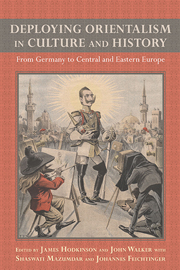Book contents
- Frontmatter
- Contents
- Preface
- Introduction
- 1 (Re)translating the West: Humboldt, Habermas, and Intercultural Dialogue
- 2 Friedrich Schlegel's Writings on India: Reimagining Germany as Europe's True Oriental Self
- 3 Germany's Local Orientalisms
- 4 Tales from the Oriental Borderlands: On the Making and Uses of Colonial Algiers in Germanophone Travel Writing from the Maghreb around 1840
- 5 The Jew, the Turk, and the Indian: Figurations of the Oriental in the German-Speaking World
- 6 M. C. Sprengel's Writings on India: A Disenchanted and Forgotten Orientalism of the Late Eighteenth Century
- 7 Occident and Orient in Narratives of Exile: The Case of Willy Haas's Indian Exile Writings
- 8 Distant Neighbors: Uses of Orientalism in the Late Nineteenth-Century Austro-Hungarian Empire
- 9 Modes of Orientalism in Hungarian Letters and Learning of the Nineteenth and Twentieth Centuries
- 10 Where the Orient Ends? Orientalism and Its Function for Imperial Rule in the Russian Empire
- 11 Noncolonial Orientalism? Czech Travel Writing on Africa and Asia around 1918
- 12 Oriental Sexuality and Its Uses in Nineteenth-Century Travelogues
- Notes on the Contributors
- Index
9 - Modes of Orientalism in Hungarian Letters and Learning of the Nineteenth and Twentieth Centuries
Published online by Cambridge University Press: 05 December 2013
- Frontmatter
- Contents
- Preface
- Introduction
- 1 (Re)translating the West: Humboldt, Habermas, and Intercultural Dialogue
- 2 Friedrich Schlegel's Writings on India: Reimagining Germany as Europe's True Oriental Self
- 3 Germany's Local Orientalisms
- 4 Tales from the Oriental Borderlands: On the Making and Uses of Colonial Algiers in Germanophone Travel Writing from the Maghreb around 1840
- 5 The Jew, the Turk, and the Indian: Figurations of the Oriental in the German-Speaking World
- 6 M. C. Sprengel's Writings on India: A Disenchanted and Forgotten Orientalism of the Late Eighteenth Century
- 7 Occident and Orient in Narratives of Exile: The Case of Willy Haas's Indian Exile Writings
- 8 Distant Neighbors: Uses of Orientalism in the Late Nineteenth-Century Austro-Hungarian Empire
- 9 Modes of Orientalism in Hungarian Letters and Learning of the Nineteenth and Twentieth Centuries
- 10 Where the Orient Ends? Orientalism and Its Function for Imperial Rule in the Russian Empire
- 11 Noncolonial Orientalism? Czech Travel Writing on Africa and Asia around 1918
- 12 Oriental Sexuality and Its Uses in Nineteenth-Century Travelogues
- Notes on the Contributors
- Index
Summary
This chapter charts the varied and changing uses of orientalist material and strategies in Hungarian culture over four distinct periods, two in the nineteenth century (1800–1850, 1850–1900) and two roughly corresponding to the two halves of the twentieth century. In the romantic period in Hungarian letters, the Orient was used for the systematic mobilization of the relevant “cultural artifacts” to highlight the “specificity” of Hungary, its differences from other European nations, and the alleged mission of the Hungarian nation in Europe. Hungary had been a part of the Habsburg monarchy from the eighteenth century, and the Habsburg monarchy provided a special framework for the collaboration of the Hungarian aristocracy in the court and in the administration. In spite of this association, the emphasis within much of the writing considered here was on features that distinguished Hungarian from Austrian and German culture, stressing the specificity of Hungarian language and folklore. The Orient that was demarcated in Hungarian letters and learning was a fluctuating concept and its shifting geographical location and parameters adapted to the political, social, and historical concerns of the day. Several tropes and formulations from earlier periods continued in orientalist discourse in these two centuries of Hungarian engagement with the Orient. In the initial two phases the link to Hungarian nationalism is the most significant feature. Traces of this are still visible in contemporary, nonacademic, populist engagement with Hungarian prehistory (before Hungarians occupied the territory of the Carpathian Basin, present-day Hungary, in AD 986) and its relationship to the Orient.
- Type
- Chapter
- Information
- Deploying Orientalism in Culture and HistoryFrom Germany to Central and Eastern Europe, pp. 166 - 189Publisher: Boydell & BrewerPrint publication year: 2013



